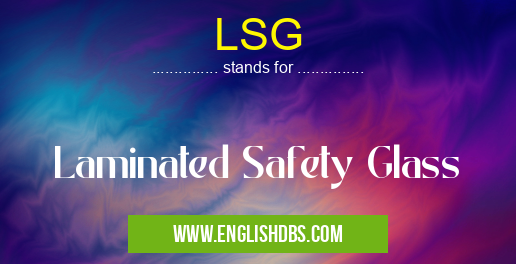What does LSG mean in UNCLASSIFIED
LSG is an abbreviation for Laminated Safety Glass. It is a type of safety glass that is made up of two or more layers of glass that are bonded together with a layer of plastic. The plastic layer helps to hold the glass together in the event of a break, which prevents it from shattering into sharp pieces.

LSG meaning in Unclassified in Miscellaneous
LSG mostly used in an acronym Unclassified in Category Miscellaneous that means Laminated Safety Glass
Shorthand: LSG,
Full Form: Laminated Safety Glass
For more information of "Laminated Safety Glass", see the section below.
Introduction: What does LSG stand for?
What is Laminated Safety Glass (LSG)?
LSG is a type of safety glass that is made up of two or more layers of glass that are bonded together with a layer of plastic. The plastic layer is usually made of polyvinyl butyral (PVB) or ethylene-vinyl acetate (EVA). The PVB or EVA layer helps to hold the glass together in the event of a break, which prevents it from shattering into sharp pieces.
LSG is often used in applications where safety is a concern, such as in car windshields, bulletproof glass, and skylights. It is also used in some architectural applications, such as in storefronts and curtain walls.
Benefits of LSG
LSG offers a number of benefits over other types of glass, including:
- Increased safety: LSG is much less likely to shatter into sharp pieces than other types of glass, which makes it a safer choice for applications where people are likely to be present.
- Improved sound insulation: The plastic layer in LSG helps to reduce noise transmission, which can make it a good choice for use in noisy environments.
- UV protection: LSG can be treated with a UV-resistant coating, which can help to protect it from the sun's harmful rays.
- Durability: LSG is more durable than other types of glass, which makes it a good choice for applications where it will be exposed to harsh conditions.
Applications of LSG
LSG is used in a variety of applications, including:
- Car windshields: LSG is used in car windshields because it is strong and safe. It is also resistant to scratches and abrasions, which helps to keep it looking clear.
- Bulletproof glass: LSG is used in bulletproof glass because it is able to stop bullets from penetrating. It is also resistant to shattering, which makes it a good choice for use in high-security applications.
- Skylights: LSG is used in skylights because it is strong and durable. It is also resistant to UV radiation, which helps to protect it from the sun's harmful rays.
- Storefronts: LSG is used in storefronts because it is strong and safe. It is also able to resist scratches and abrasions, which helps to keep it looking clear.
- Curtain walls: LSG is used in curtain walls because it is strong and durable. It is also able to resist UV radiation, which helps to protect it from the sun's harmful rays.
Conclusion: LSG - A versatile and safe glass option
LSG is a versatile and safe glass option that can be used in a variety of applications. It is strong, durable, and resistant to shattering, which makes it a good choice for applications where safety is a concern. LSG is also available in a variety of colors and thicknesses, so it can be customized to meet the specific needs of any project.
Essential Questions and Answers on Laminated Safety Glass in "MISCELLANEOUS»UNFILED"
What is Laminated Safety Glass (LSG)?
LSG is a type of safety glass that consists of two or more layers of glass bonded together with a layer of tough, flexible plastic interlayer, usually polyvinyl butyral (PVB). The interlayer holds the glass together even when it's broken, reducing the risk of injury and damage.
What are the benefits of using Laminated Safety Glass?
LSG offers several advantages, including:
- Enhanced safety: The interlayer prevents the glass from shattering into dangerous shards, reducing the risk of cuts and injuries.
- Security: LSG is harder to break than regular glass, making it more resistant to forced entry and vandalism.
- Noise reduction: The interlayer absorbs sound, reducing noise transmission through the glass.
- UV protection: The interlayer blocks harmful UV rays, protecting interior furnishings and preventing fading.
Where is Laminated Safety Glass commonly used?
LSG is widely used in various applications where safety and security are paramount, such as:
- Vehicle windshields and side windows
- Architectural glazing in buildings, including windows, doors, and skylights
- Storefronts and display cases
- Safety barriers and partitions
- Overhead glazing and canopies
How is Laminated Safety Glass different from tempered glass?
Laminated safety glass differs from tempered glass in several ways:
- Safety: In the event of breakage, LSG holds together, preventing large shards of glass from flying out. Tempered glass, on the other hand, shatters into small, relatively harmless pieces.
- Strength: LSG is generally stronger than tempered glass due to the reinforcing interlayer.
- Visual appearance: LSG typically has a slightly greenish tint due to the interlayer, while tempered glass is clear.
Can Laminated Safety Glass be used outdoors?
Yes, LSG can be used outdoors due to its resistance to weather and UV radiation. The interlayer protects the glass from fading, yellowing, and other forms of degradation caused by prolonged sun exposure.
LSG also stands for: |
|
| All stands for LSG |
